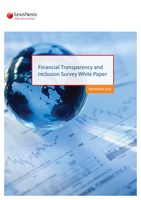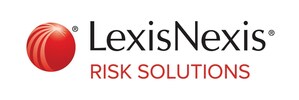Despite broad consensus amongst AML professionals, barriers to greater financial transparency and inclusion remain in world economy
- According to LexisNexis Risk Solutions research, AML professionals in the banking industry share priorities of policymakers and regulators for fostering financial inclusion
- However, shadow banking, derisking and operational difficulties in onboarding remain obstacles to this ambitious set of global objectives
PARIS, Oct. 30, 2017 /PRNewswire/ -- As the 2017 edition of Financial Inclusion Week gets underway worldwide, global financial institutions are facing sustained pressures to deepen and extend their actions in favour of financial inclusion, in a context in which greater regulatory scrutiny, such as anti-money laundering and counter terrorist financing measure, is driving step change within the industry. As a political priority on a global scale, regularly put forward by G20 nations on their policy agenda, financial inclusion is also an objective that banks and other credit institutions pursue in an active way.
Research conducted by LexisNexis® Risk Solutions suggests that there is a shared willingness within financial services not only to lead the fight against 'dirty money' but to bring underbanked and unbanked people into the financial system. In a global survey conducted by LexisNexis Risk Solutions amongst 300 financial services senior managers with AML Compliance responsibilities, an overwhelming majority of respondents (87 per cent) perceive financial inclusion and transparency as part of the same virtuous circle for fostering sustainable economic growth, while over three quarters (77 per cent) claim that providing financial services to the unbanked was very important to their business. However, the research and other factors show that, in today's environment, much needs to be done to achieve these goals and transform this vision into reality.
Although most of the surveyed banks in LexisNexis Risk Solutions' research (around 85 per cent) find that the onboarding process is a competitive advantage as it is critical in determining the lifetime value of customers, many respondents also reported lost deals and revenues as a result in onboarding deficiencies. KYC (Know Your Customer) checks can constitute a significant challenge at this crucial stage of bringing new clients into the banking system, and some of these due diligence requirements can discourage and dishearten potential new clients due to the profile of customer in question. For example, while checks for a domestic retail costumer or a SME/midmarket corporate account can be done in less than one working day, the same processes can take longer for foreign individuals or corporates, showing us that, despite the globalization of financial services and the proliferation of innovative technologies, delays and organisational obstacles linked to KYC processes can sometimes prevent economies banking new populations, thus becoming more open and inclusive. Overall, half of financial institutions surveyed by LexisNexis Risk Solutions turned away between 6 and 15 per cent of potential retail customers due to their current KYC or current credit risk management process.
Beyond friction that can be generated during onboarding on a customer service level, there is a wider problem that could threaten policy maker's prioritization of financial inclusion. Derisking by certain financial institutions means the wholesale exclusion of challenging geographies and client types in order to filter out such AML compliance problems from the outset. Such as result, as well as showing how some in the industry will aim to cut corners while cutting bureaucracy and optimizing costs, would actually be counter-productive for counter terrorist-financing and AML legislation, in so far as it is likely to push fund transfers to informal and less-regulated channels. Potential damaging consequences can be a rise in shadow banking and a fall in the importance of financial inclusion on the world policy agenda for developing regions, where the most unbanked people live without access to effective financial services. For individuals and businesses struggling to access finance, both in the developed and developing world, with little or no credit history, one of the key obstacles remains that information on these people is dispersed across different credit bureaus and institutions. The potential benefits that a central utility of information sharing could bring for financial inclusion seems clear, and only one surveyed bank amongst 300 claimed their business would not benefit from such a capability. A large majority (78%) also said that they would be willing to share data in order to move towards an industry utility model, despite the many challenges such a transformation would entail (adjusting workforces, changing processes, tackling potential regulatory hurdles on data protection etc.).
Kader Djouadi, Financial Crime Compliance Manager, Head of France at LexisNexis® Risk Solutions, stated: "As the world looks to promote praiseworthy values during Financial Inclusion Week, we should also take the opportunity to think about the most effective ways to tackle financial exclusion, not just as an industry issue but a social one as well. Our research shows that there is a clear disconnect between the willingness of banks to increase financial inclusion all over the world and the lack of measurable progress in certain areas of the world. For example, World Bank data shows us that still only 35% of over 15 year olds in Sub-Saharan Africa have a bank account, whereas the rate for Europe and Central Asia is over 50%. Mobile payment has allowed some breakthroughs to be made on the African continent, and here in France fintechs can provide innovative solutions, but these examples are still only a drop in the ocean. The cornerstone of a coherent strategy hinges around data and the access that institutions and credit bureaus have to such information in order to lend in better confidence. Although our survey is encouraging in that it shows that financial inclusion is a priority for many, regulators, banks and governments should work more intelligently together and reflect on new ways to innovate in this area, whether that be to increase use of credit profile software, reducing documents needed to access credit and often seen as an obstacle, and the streamlining of compliance systems."
| Press contacts
LexisNexis Risk Solutions Jean Creech Tel: +1 678 694 2439 Email: [email protected]
Steele & Holt Bénie Igiraneza Tel.: 01 85 08 04 54 Email: [email protected] |
Steele & Holt Dominic Riding Tel.: 01 86 95 00 08 Email: [email protected] |
About LexisNexis® Risk Solutions
At LexisNexis Risk Solutions, we believe in the power of data and advanced analytics for better risk management. With over 40 years of expertise, we are the trusted data analytics provider for organizations seeking actionable insights to manage risks and improve results while upholding the highest standards for security and privacy. Headquartered in metro Atlanta, LexisNexis Risk Solutions serves customers in more than 100 countries and is part of RELX Group, a global provider of information and analytics for professional and business customers across industries. For more information, please visit www.lexisnexis.com/risk.
SOURCE LexisNexis Risk Solutions
Related Links
WANT YOUR COMPANY'S NEWS FEATURED ON PRNEWSWIRE.COM?
Newsrooms &
Influencers
Digital Media
Outlets
Journalists
Opted In






Share this article